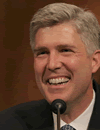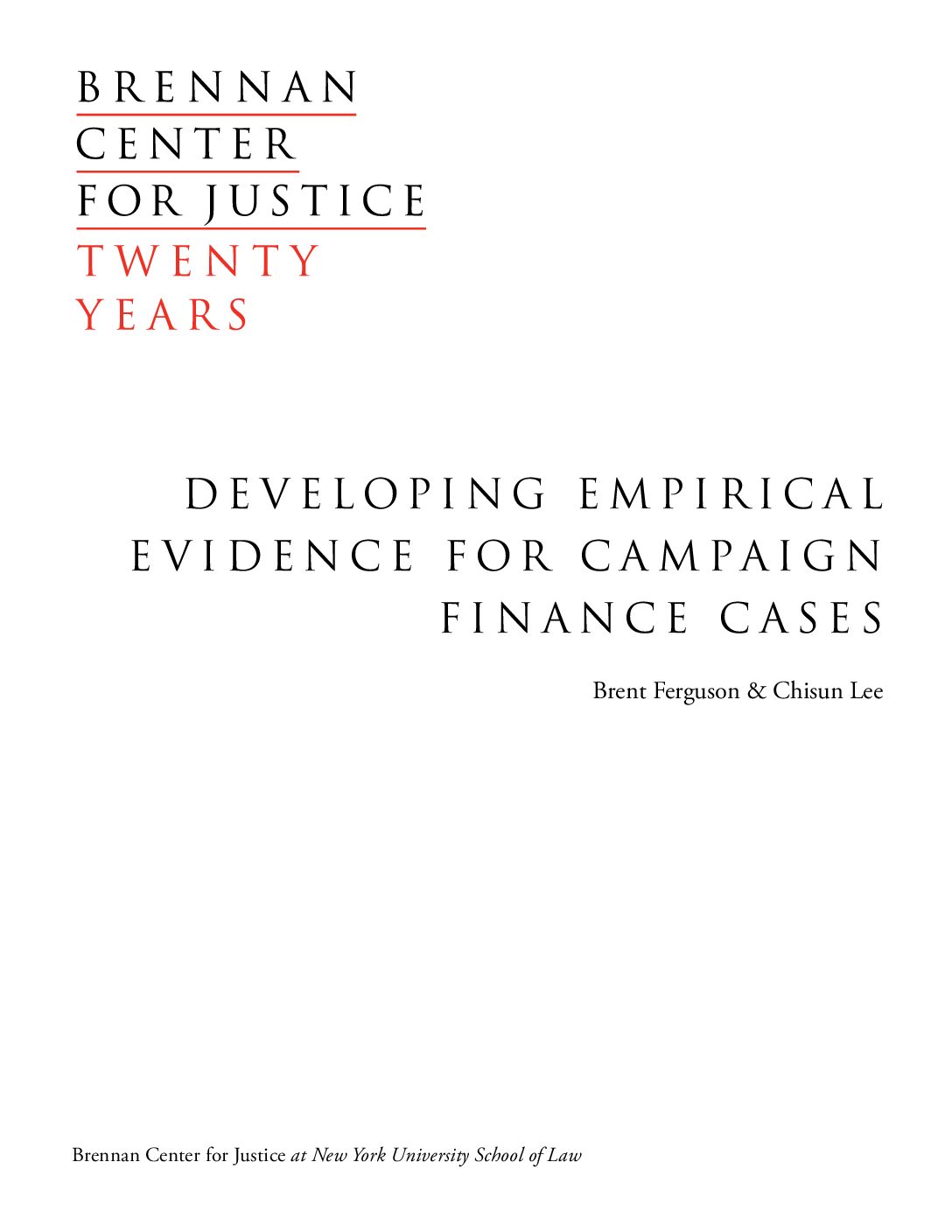Hon. Steven Colloton
United States Court of Appeals for the Eighth Circuit (2003-Present)
Using our initial screen to find cases, Judge Colloton wrote or joined an opinion in three notable First Amendment cases while on the Eighth Circuit:
- Minnesota Citizens Concerned for Life, Inc. v. Swanson, 692 F.3d 864 (8th Cir. 2012) (en banc) (Colloton, J., concurring in part and dissenting in part).
- Wersal v. Sexton, 674 F.3d 1010 (8th Cir. 2012) (Colloton, J., dissenting in part).
- Phelps-Roper v. Troutman, 662 F.3d 485 (8th Cir. 2011) (Colloton, J., concurring).
The most significant of the three decisions, by far, is Minnesota Citizens. In that case, Judge Colloton would have limited First Amendment speech rights of corporate speakers making “independent expenditures” – spending that directly supports or opposes political candidates – and upheld disclosure requirements for that activity. Fortunately, the majority in that case ruled in favor of First Amendment rights. The dissent, joined by Colloton, would have granted lawmakers “extreme deference” to limit free speech and invade donor privacy.
In Wersal, Judge Colloton defended the First Amendment right of Minnesota state judges to endorse candidates and solicit funds for their judicial campaigns. In Phelps-Roper, Colloton concurred in the judgment, and again sought to limit First Amendment rights.[1]
Minnesota Citizens Concerned for Life, Inc. v. Swanson
Appellants in Minnesota Citizens challenged several provisions of Minnesota campaign finance law following the Supreme Court’s ruling in Citizens United v. FEC. After Citizens United was decided, Minnesota passed a law requiring corporations (including nonprofits) wishing to speak out on political candidates to create “political funds” similar to PACs. A group of incorporated entities challenged both that requirement and Minnesota’s ban on corporate contributions to candidate campaigns, and sought an injunction against enforcement of the law.
The Eighth Circuit heard the case en banc – meaning that the case was heard by all active circuit judges, and not merely a three-judge panel. A majority found that appellants would likely win on the independent expenditure issue, but fail in their challenge to the contribution ban.
The majority opinion concluded that “Minnesota’s campaign finance laws unconstitutionally infringe upon the right to engage in political speech through independent expenditures.” The majority found that, even under exacting scrutiny, the burdens imposed by requiring speech to be conducted via political funds and the attendant disclosure and reporting requirements were likely unconstitutional. But Colloton joined a dissent from this pro-free speech decision.
Here are key excerpts from the majority opinion:
Minnesota’s law provides two options for corporations and limited liability companies to participate in making independent expenditures…. Both options require compliance with certain organizational, record-keeping, and reporting requirements. Importantly, these laws reach not just corporations and limited liability companies, but nearly all associations…. [Emphasis in original.]
First, an association may indirectly make an independent expenditure “by contributing to an existing independent expenditure political committee or political fund….”
For an association directly to make an independent expenditure, it must create and register its own independent expenditure political fund (political fund). Once an association forms a political fund, it must elect or appoint a treasurer and ensure the contents of the fund are not commingled with other funds [and file regular reports with the state regardless of whether it participated in political activity]….
[Reporting requirements were triggered by expenditures of as little as $100.]
Minnesota’s law imposes virtually identical regulatory burdens upon political funds as it does political committees. This equality of burdens is meaningful in view of past judicial efforts to ensure laws imposing PAC status and accompanying burdens are limited in their reach….
By subjecting political funds to the same regulatory burdens as PACs, Minnesota has, in effect, substantially extended the reach of PAC-like regulation to all associations that ever make independent expenditures. [Emphasis in original.]
The Supreme Court has recognized forcing a corporation to speak through a PAC creates “First Amendment problems” because of the associated regulatory burdens….
In Citizens United, the Supreme Court characterized PACs as “burdensome alternatives” to direct corporate speech because “they are expensive to administer and subject to extensive regulations.” The Supreme Court highlighted requirements substantially similar to those Minnesota imposes upon political funds. The Court surmised these “onerous restrictions” likely stop many corporations from speaking through PACs. We surmise the same is true of Minnesota’s expansive regulation of political funds.
Perhaps most onerous is the ongoing reporting requirement. Once initiated, the requirement is potentially perpetual regardless of whether the association ever again makes an independent expenditure….
Suppose two Minnesota farmers owning adjoining property near a highway support a particular candidate for state office. The farmers decide to erect a large sign in support of the candidate and spend over $100 in supplies and labor. To comply with Minnesota’s law, the farmers must create and register a political fund, appoint a treasurer, keep detailed records, and file ongoing reports with the Board. The farmers must continue to file even if the farmers do not continue to “speak.” To escape these ongoing burdens, the farmers must file a termination statement. Before they can do that, they must dispose of the political fund’s assets—including the sign. If the farmers forget to file, or assume continued reporting is unnecessary, they are subject to significant fines and possible imprisonment.
Faced with these regulatory burdens—or even just the daunting task of deciphering what is required under the law … the farmers reasonably could decide the exercise is simply not worth the trouble. And who would blame them? … In short, the collective burdens associated with Minnesota’s independent expenditure law chill political speech.
This chill is more than a theoretical concern. All three appellants—two nonprofit issue advocacy groups and one for-profit travel-services provider—claim to have abandoned planned independent expenditures in order to avoid the accompanying regulatory burdens.
Judge Colloton joined a dissent from this reasoning. Worse, this dissent belittled the burdens imposed by the challenged law. As noted by the majority:
The dissent minimizes this concern [about chill of political speech], stating “even the smallest business regularly files government forms and reports that are significantly more complicated and burdensome than the requirements of Minnesota’s disclosure laws.” We disagree with such broad, unsupported conjecture, but assuming the statement is true, it misses the point. Most associations—no matter the size—are capable, for example, of assembling and completing the paperwork necessary to file tax returns. But such paperwork is not a burden interfering with the constitutionally protected marketplace of ideas. Unlike compliance with the mandatory tax laws, the laws at issue here give Minnesota associations a choice—either comply with cumbersome ongoing regulatory burdens or sacrifice protected core First Amendment activity….
The district court characterized the challenged provisions as a disclosure law and accordingly determined exacting scrutiny was appropriate. We question whether the Supreme Court intended exacting scrutiny to apply to laws such as this, which subject associations that engage in minimal speech to “the full panoply of regulations that accompany status as a [PAC].” Allowing states to sidestep strict scrutiny by simply placing a “disclosure” label on laws imposing the substantial and ongoing burdens typically reserved for PACs risks transforming First Amendment jurisprudence into a legislative labeling exercise.
But even if exacting scrutiny is appropriate … Minnesota’s law fails….
The dissent complains we discount Minnesota’s interests, resulting in “an unbalanced and flawed application of the exacting scrutiny analysis.” Our discussion of these interests is limited, however, not because we doubt their importance … but because Minnesota has not stated any plausible reason why continued reporting from nearly all associations, regardless of the association’s major purpose, is necessary to accomplish these interests. [Emphasis in original.]
This dissenting opinion should concern those who favor First Amendment rights to free speech. There, Judge Colloton took the side of the government over citizen nonprofit advocacy groups wishing to participate in politics. He would allow corporations to speak only through a political fund, with a low $100 threshold for triggering reporting burdens, on the grounds that this infringement of First Amendment rights is “not wholly irrational.”
The dissent would have given lawmakers a nearly blank check to place regulatory burdens on free speech:
The Minnesota legislature has chosen to impose these burdens not on everyone who makes campaign-related expenditures, but rather, only on those who spend more than $100 in one year. With regard to this decision of where to set reporting thresholds, “we cannot require [the legislature] to establish that it has chosen the highest reasonable threshold. The line is necessarily a judgmental decision, best left in the context of this complex legislation to [legislative] discretion….” Accordingly, we should review these decisions with extreme deference, and require only that the legislature’s choice be rational. [Emphasis added.]
Again, we note that Judge Colloton and the others who joined the dissent seemed unconcerned that two citizens spending a mere $100 to advocate in an election would require them to comply with extensive registration and reporting burdens to the state.
Judge Colloton takes the other side in Wersal. Here, he recognized important First Amendment issues at stake in a case challenging the constitutionality of Minnesota’s restrictions on judicial campaigning. He dissented from the en banc opinion. Applying strict scrutiny, Judge Colloton finds the “endorsement clause” and “personal solicitation” clause of Minnesota’s Code of Judicial Conduct shouldn’t survive strict scrutiny.
The endorsement clause states a judge or a judicial candidate shall not “publicly endorse or, except for the judge or candidate’s opponent, publicly oppose another candidate for public office.”
Judge Colloton found that this clause failed strict scrutiny:
The endorsement clause eliminates one useful way for a judicial candidate to associate with other candidates for office and to communicate to the voters his or her outlook on issues of the day. The appellees’ principal justification for the ban on endorsements is that it furthers a compelling interest in maintaining impartiality…. But the rule is barely tailored to achieve this objective, and when an endorsement does frustrate the asserted state interest, the problem almost always can be remedied by recusal. This prohibition on political speech is thus not narrowly tailored to further a compelling government interest.
Despite the endorsement clause, a judicial candidate remains free to make positive statements about another candidate for office….
Judicial Candidate X, however, may announce that “I agree with Senator Y on all of the issues of the day.” Judicial Candidate X may declare that “Senator Y has done an excellent job, and I am going to vote for Senator Y.” Id. And Judicial Candidate X may speak directly in favor of reelecting Senator Y as long as the speech comes before Senator Y officially becomes a “candidate” for reelection….
To prohibit the judicial candidate from using the magic words of endorsement does not further the State’s interest in maintaining the impartiality of judges in any material way. If a judicial candidate’s formal endorsement of a legislator would establish disqualifying bias in favor of the legislator, then so too would numerous other statements of praise, support, or association that are not forbidden by the Code of Judicial Conduct….
Even assuming, in the alternative, that a formal endorsement creates a bias that is not generated by other permissible public statements, recusal is a less restrictive means of achieving the objective of judicial impartiality. The Supreme Court in Caperton v. A.T. Massey Coal Co., 129 S. Ct. 2252, 2267 (2009); id. at 2268-69 (Roberts, C.J., dissenting), and Justice Kennedy in White I, 536 U.S. at 794 (Kennedy, J., concurring), emphasized that States are free to adopt recusal standards more rigorous than the Due Process Clause requires.
Judge Colloton found that the state’s asserted interests in “judicial independence,” the appearance of favoritism or bias against a party, and the prestige of judging did not overcome strict scrutiny.
He also found the “personal solicitation” clause, which forbids judges from directly asking for contributions except under specified and limited conditions, shouldn’t survive constitutional review. The Judicial Code required most contributions to be shuffled through a campaign committee, which supposedly ensured anonymity.
Judge Colloton began by quoting a Sixth Circuit opinion:
Prohibiting candidates from asking for money suppresses speech in the most conspicuous of ways and, in the process, favors some candidates over others—incumbent judges (who benefit from their current status) over non-judicial candidates, the well-to-do (who may not need to raise any money at all) over lower-income candidates, and the well-connected (who have an army of potential fundraisers) over outsiders. For these reasons, it is tempting to say that any limitation on a candidate’s right to ask for a campaign contribution is one limitation too many.
Relying on strict scrutiny analysis, he continued:
The personal solicitation clause is not narrowly tailored to advance the asserted government interests. The prohibition is not limited to solicitation by sitting judges, so it is not narrowly tailored to prevent an asserted interest in the abuse of judicial office. The appellees’ case, rather, hinges on the assumption that a judicial candidate who personally solicits funds will learn who has contributed and how much, and then develop a bias or perceived bias as a result…. [Emphasis in original.]
There is good reason to doubt the effectiveness of the Minnesota rules that are designed to prevent judges from learning the identities of contributors. Information about contributors is a matter of public record, available on the Internet. It is hard to believe that a vigilant press would not report the fact that a party appearing before a particular judge was a financial contributor to the judge’s campaign. And judges are not forbidden to read the news….
The appellees also ignore… the message of Caperton and Justice Kennedy’s concurrence in White I that the States are free to adopt recusal standards that are more rigorous than due process requires. They argue primarily that motions to disqualify rarely succeed under current rules. But if the appellees are concerned that judges will be biased or apparently biased in favor of contributors or against noncontributors, then they can implement rules that require recusal when certain contributors appear before the judge, or on motion of a solicited person who has declined to contribute. This approach would avoid infringing on First Amendment rights, eliminate the asserted bias and appearance of bias, and remove any potential for coercion of prospective donors, who could be assured that the judicial candidate will never preside over a solicited person’s case….[Emphasis in original.]
In Phelps-Roper, Judge Colloton concurred with the majority’s broad view of the First Amendment, He wrote that the panel must follow existing precedent, but suggested that that precedent is wrong. Phelps-Roper involved the Westboro Baptist Church’s right to protest the funerals of fallen soldiers based on the Church’s moral disagreements with U.S. policy and cultural norms.
The specific issue was whether a district court erred by refusing to grant Phelps-Roper an injunction against a Nebraska funeral law that limited peaceful demonstrations near funerals. The panel followed a 2008 precedent:
We agree that the district court here was required to follow our Nixon precedent, which concluded that the government was unlikely to prove a significant interest in protecting funeral attendees. The Nixon panel cited our court’s earlier refusal to extend application of the captive audience doctrine beyond the residential context. The district court’s efforts to distinguish Nixon are not persuasive. That the Nixon panel erroneously used the term “compelling interest” rather than “significant interest” in describing Olmer is not a sufficient basis to avoid circuit precedent that expressly applied the “holding in Olmer.” Nor can Nixon be distinguished based on the nature of the mourners protected. The Missouri statute, like the Nebraska statute, protected family members attending a relative’s funeral. Nixon was premised on the panel’s view, derived from Olmer, that the government has no significant interest in protecting unwilling listeners outside the context of a home.
Based on the Nixon precedent, the panel found that Phelps-Roper would likely succeed on the merits and reversed the district court.
Judge Colloton concurred in the judgment, stating that the panel was bound by precedent while suggesting that the precedent was faulty:
For reasons explained in the per curiam opinion, this panel is bound by Phelps-Roper v. Nixon, 545 F.3d 685, 691-92 (8th Cir. 2008), to reverse the judgment of the district court. Five judges voted to rehear Nixon en banc, id. at 685 n.*, and I continue to favor reconsideration of that precedent.
The Nixon precedent was eventually overturned, with Colloton joining the opinion. Phelps-Roper v. City of Manchester, 697 F.3d 678 (8th Cir. 2012).
The Manchester decision was unanimous, but Judge Lavenski Smith wrote a concurrence to warn about the opinion’s implications. The Circuit had granted only the third exception ever given to peaceful demonstrations – prior exemptions were for the home and a medical facility.
Writing only for himself, Judge Smith concurred:
I write separately to express concern about the extension of the unique protection afforded the sanctuary of the home to funerals and burials. Manchester states a “significant” interest, but the question is close and the grade on this slope should not be seen as having been greased….
But make no mistake, this court is extending the circumference of what this circuit has previously found constitutes a significant government interest. The uniqueness of the funeral assembly justifies it. We must be concerned, however, that few, if any, other places become walled off to the free expression of ideas due to their potential effect on the hearer…. However, if government is enabled to restrict otherwise lawful speech for its emotional offensiveness alone, divorced from any potential physical harm, its ability to do so may not end with th[is] case….
[1] Internal citations to other cases have been omitted from the excerpts below.














